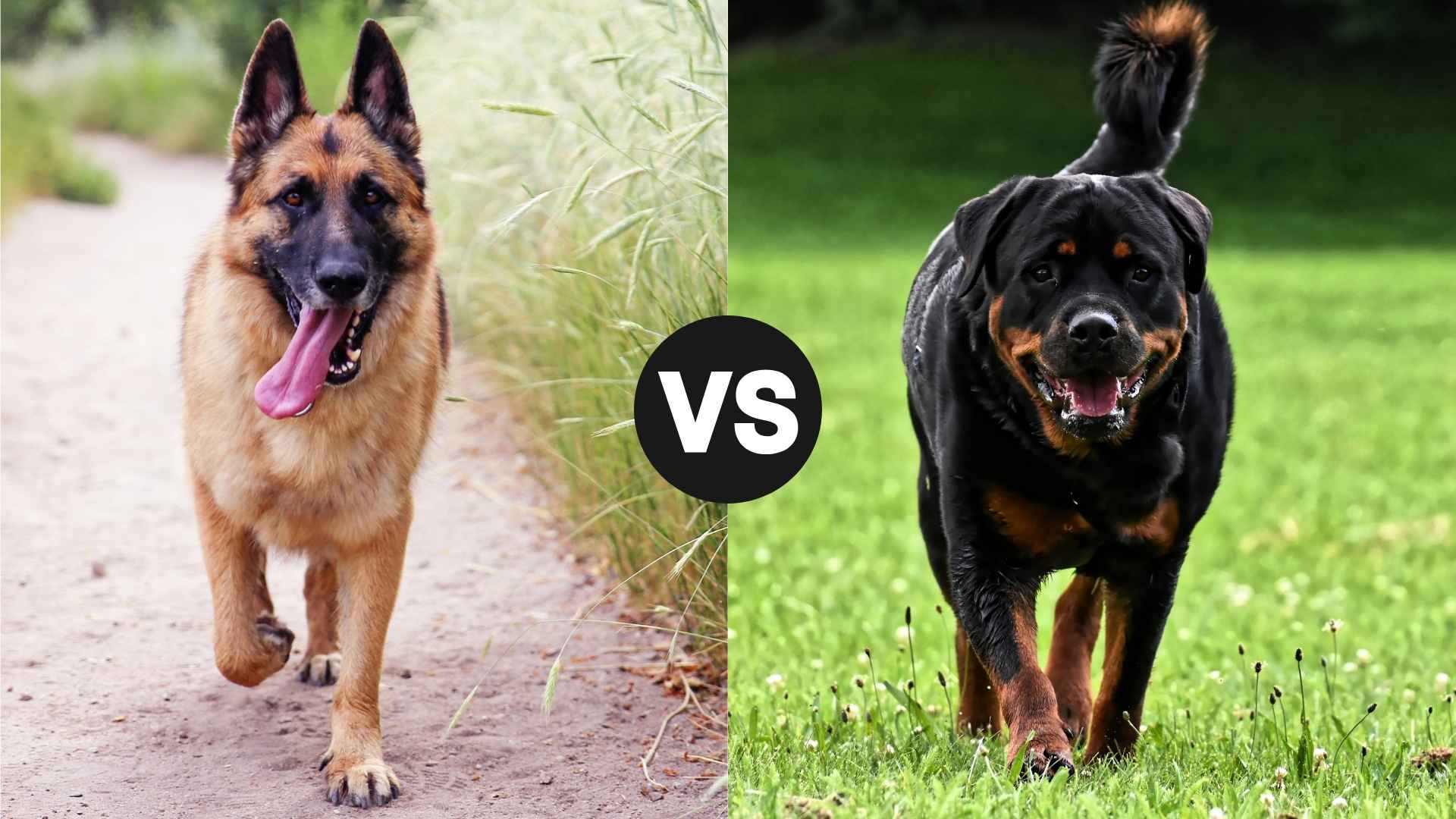Two muscular, majestic powerhouses enter the ring. On one side: the sharp-minded, ever-vigilant German Shepherd. On the other hand, the strong, confident, and fiercely loyal Rottweiler. But this isn’t a battle—it’s a deep dive into two of the most respected (and sometimes misunderstood) dog breeds out there.
Both breeds have earned their reputations as top-tier protectors and working dogs. They’re intelligent, courageous, and fiercely loyal—but they’re also very different in energy, personality, and the type of household they thrive in. One may suit a structured, high-activity lifestyle, while the other fits better in a chill, family-focused environment, with a side of personal security.
Whether you’re drawn to the alert elegance of the Shepherd or the quiet strength of the Rottie, understanding their key differences can help you make the right match, not just for your lifestyle, but for your heart.
So if you’re stuck between these two canine titans, this comparison will guide you through temperament, trainability, exercise needs, and more. Let the showdown begin.
German Shepherd vs. Rottweiler
Size Comparison
If big dogs had a wrestling league, the German Shepherd and Rottweiler would be the heavyweight champs—big, bold, and built like canine tanks with hearts of gold. Let’s unleash the facts, with a little humor along the way.
German Shepherd:
Originally bred to herd sheep, this dog has since taken on a variety of roles—including disability assistance, search-and-rescue, police work, and even military duties. Today, it’s also a popular and beloved companion animal, says Wikipedia.
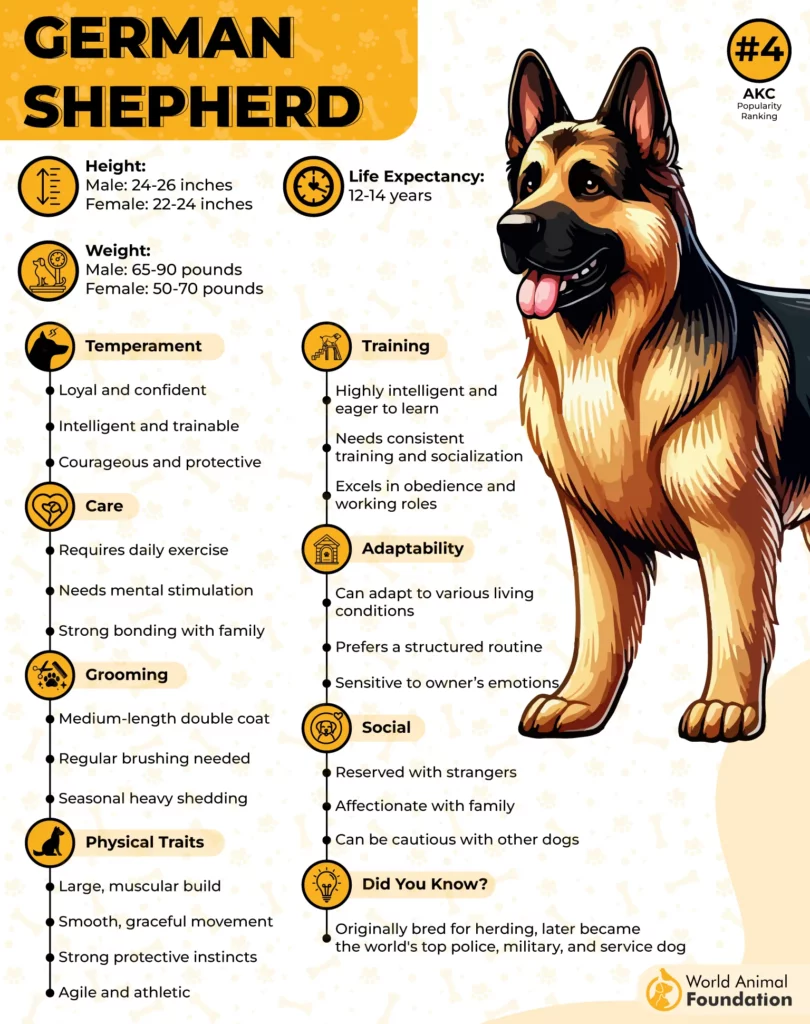
-
Height: 22 to 26 inches at the shoulder
-
Weight: 50 to 90 pounds
-
Build: Athletic and agile—like a furry Navy SEAL
-
Vibe: Lean muscle, long legs, and a powerful stance that says, “I could herd a flock of sheep… or just your kids to bed.”
German Shepherds have that alert, upright-eared look like they’re always two steps ahead of you. Built for endurance and speed, they carry their weight in muscle and smarts.
Rottweiler:
The Rottweiler is a powerful working dog breed believed to have descended from drover dogs that herded livestock. After a decline in popularity, they made a strong comeback in the early 20th century and have since taken on important roles in police and military work.
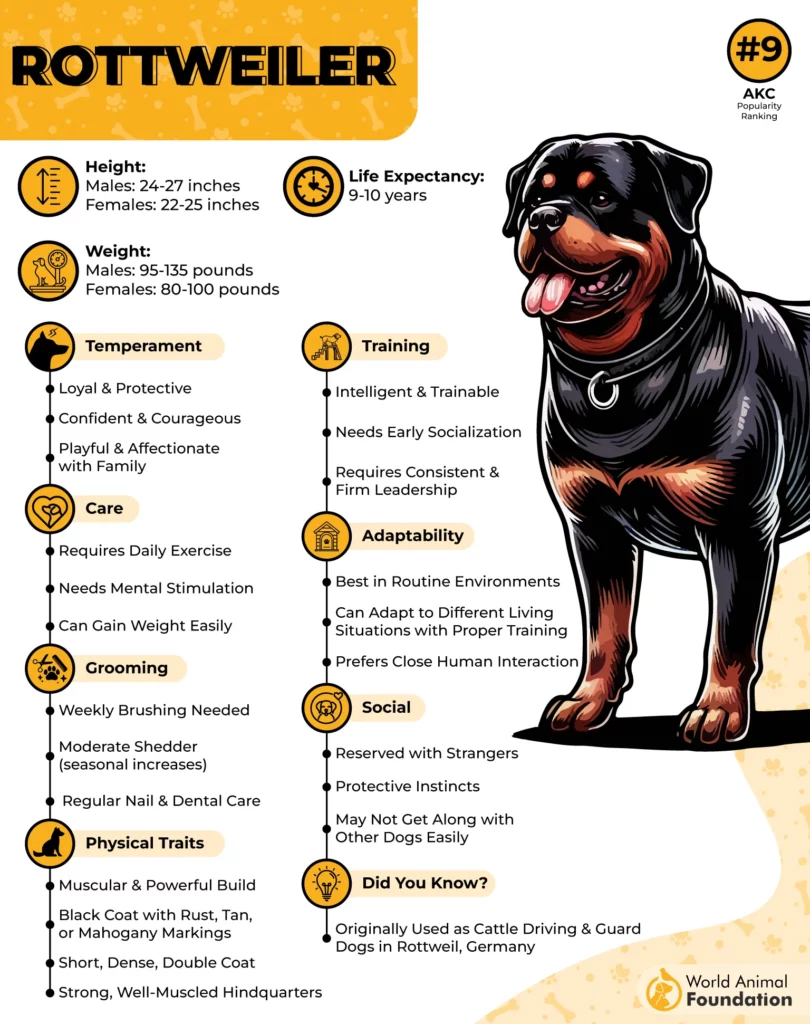
-
Height: 22 to 27 inches at the shoulder
-
Weight: 80 to 135 pounds
-
Build: Thick, solid, and strong enough to bench-press your SUV (okay, almost)
-
Vibe: Broad chest, blocky head, and a swagger that screams, “Security’s here—where’s the threat?”
Rottweilers are the canine version of a bouncer with a soft spot for belly rubs. These medium-sized dogs may not look fast, but don’t be fooled—they can hustle when it counts.
Strength Face-Off: Who’s More Powerful?
Let’s face it—both the German Shepherd and Rottweiler are total powerhouses. These aren’t your average lap dogs (though don’t tell them that, they’ll still try). But when it comes to raw strength, bite force, and overall muscle power, who truly dominates the doggy battlefield?
German Shepherd:
German Shepherds don’t just rely on brute strength—they’re all about calculated power. Think of them as canine special ops: agile, smart, and strong when it matters most.
-
Bite Force: Around 238 PSI (pounds per square inch)
-
Strength Style: Athletic endurance + precise takedown skills
-
Famous For: Police K9 units, military roles, search and rescue, and outsmarting their humans
German Shepherds won’t just overpower—they’ll outthink their opponent, then use speed and strategy to get the job done. That’s why they’re the go-to breed for high-stakes work.
Rottweiler:
If the German Shepherd is a special forces soldier, the Rottweiler is the tank. These dogs are walking walls of muscle, with a bite that can make even the toughest intruder think twice.
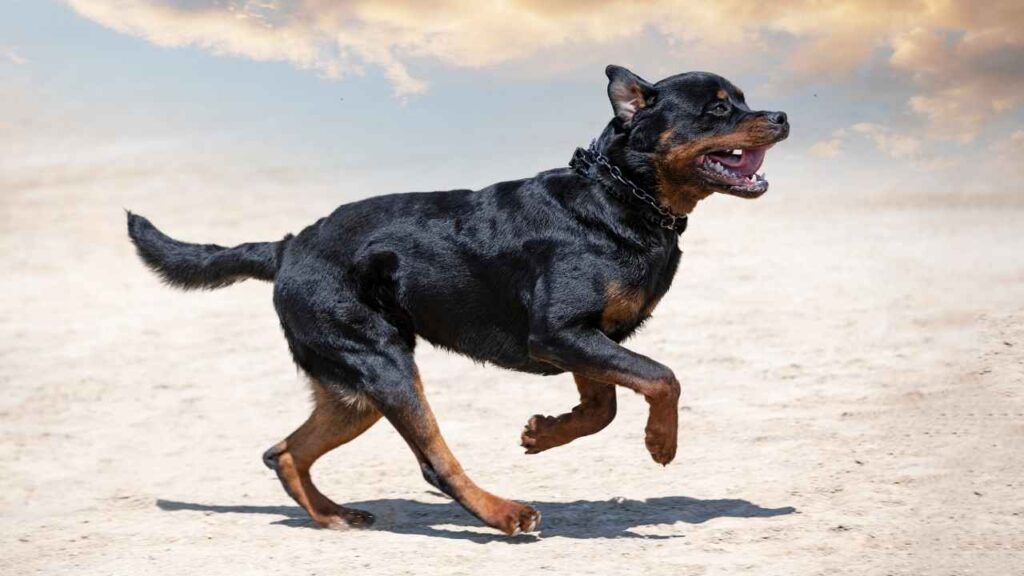
-
Bite Force: Around 328 PSI
-
Strength Style: Brute muscle + bone-crushing jaws
-
Famous For: Guard work, pulling carts (seriously!), and scaring off anyone who touches the snack stash
Rottweilers don’t play when it comes to power. With their low center of gravity and solid frame, they can easily take down threats or just drag you across the park if a squirrel disrespects them.
Personality & Temperament Traits
Both the German Shepherd and Rottweiler are legends in the loyalty department, but their vibes? Let’s break down the doggy DNA of their temperament—quirks, cuddles, and all.
German Shepherd:
Vibe: The type-A kid in class who does extra credit for fun
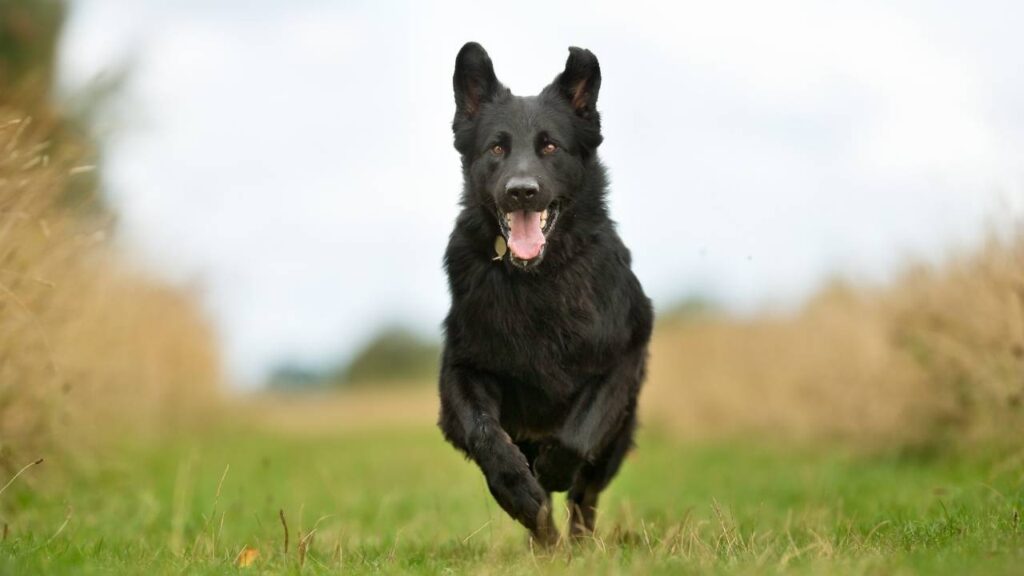
Personality Snapshot:
-
Most intelligent dog breed – Like, almost too smart
-
Energetic – Needs a job or hobby (herding, agility, solving escape rooms…)
-
Loyal to the bone – Bonds deeply with their people
-
Alert and vocal – Will absolutely tell you if the wind changes direction
-
Protective, but trainable – Not aggressive by default, but they’re no pushover either
German Shepherds thrive in homes where they’re mentally and physically challenged. If they’re bored? Expect redecorating, with shredded pillows.
Rottweiler:
Vibe: That quiet guy at the gym who looks intimidating until you see him baby-talking his dog
Personality Snapshot:
-
Confident and calm – Rotties don’t overreact—they observe
-
Incredibly loyal – Once you’re in their circle, you’re in for life
-
Protective instinct – Excellent guard dog, but needs training to stay chill
-
Independent thinker – Not as eager to please as a Shepherd, but still trainable
-
Affectionate with family – Big babies with their people, aloof with strangers
They’re best for experienced owners who can establish trust and structure. With proper socialization, they’re gentle giants… with a little side of “Don’t mess with my house.”
Health and Lifespan
Both the German Shepherd and the Rottweiler are strong breeds, but they do come with their own health quirks and care needs. So let’s get real (but keep it fun) about who’s got the edge in the health and lifespan department.
German Shepherd:
Average Lifespan: 9 to 13 years
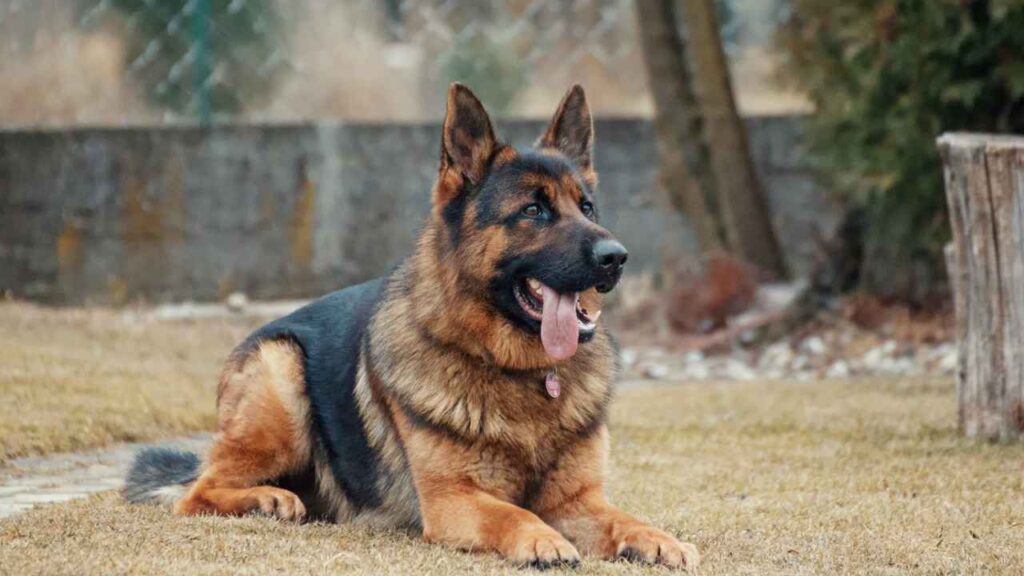
Common Health Issues:
-
Elbow & Hip dysplasia (big one for the breed)
-
Degenerative myelopathy (a spinal condition—think doggy arthritis on steroids)
-
Bloat (aka the scary stomach twist thing)
-
Allergies & skin sensitivities
German Shepherds are highly active, athletic dogs, but that constant motion comes at a price. Their joints tend to wear out early, especially if not properly exercised or fed a joint-supporting diet. But with good breeding and vet care? They can be your buddy for over a decade.
Health Tip: Regular exercise, joint supplements, and not letting them jump off the couch like it’s the X-Games can help extend their active years.
Rottweiler:
Average Lifespan: 8 to 10 years
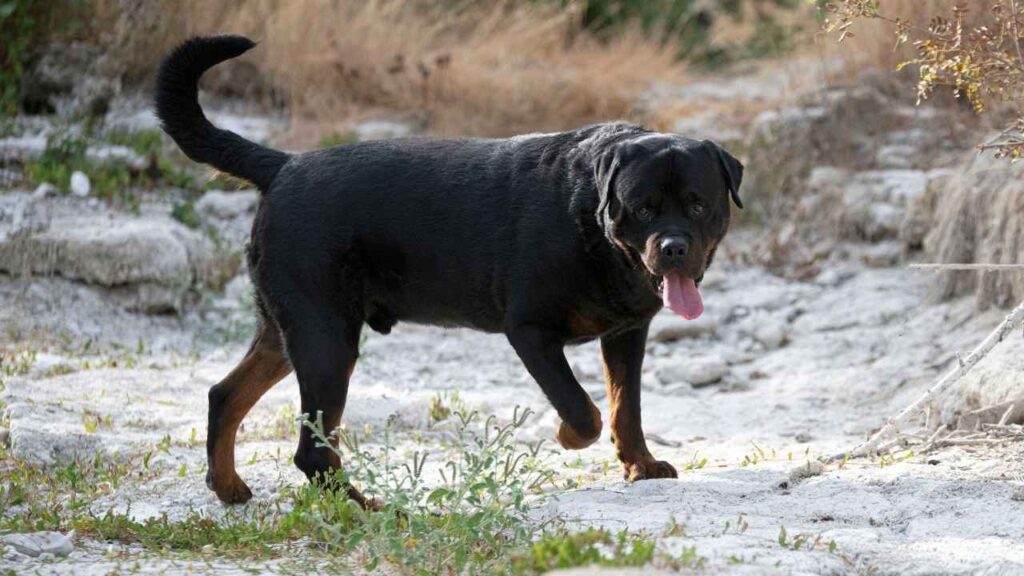
Common Health Issues:
-
Cancer (especially bone cancer)
-
Hip dysplasia (yep, them too)
-
Obesity (they love treats like we love pizza)
-
Heart conditions, especially aortic stenosis
Health Tip: Keep their weight in check, get regular vet screenings (especially for heart and cancer risks), and don’t let their “tough guy” act fool you—these dogs need TLC.
Intelligence and Trainability
When it comes to smarts, both the German Shepherd and Rottweiler are sharp as a tack, like the honor roll students of the dog world. But how do they use that intelligence? Totally different stories.
German Shepherd:
Training Style: “Teach me once—I’ve already mastered it, added flair, and made a PowerPoint.”
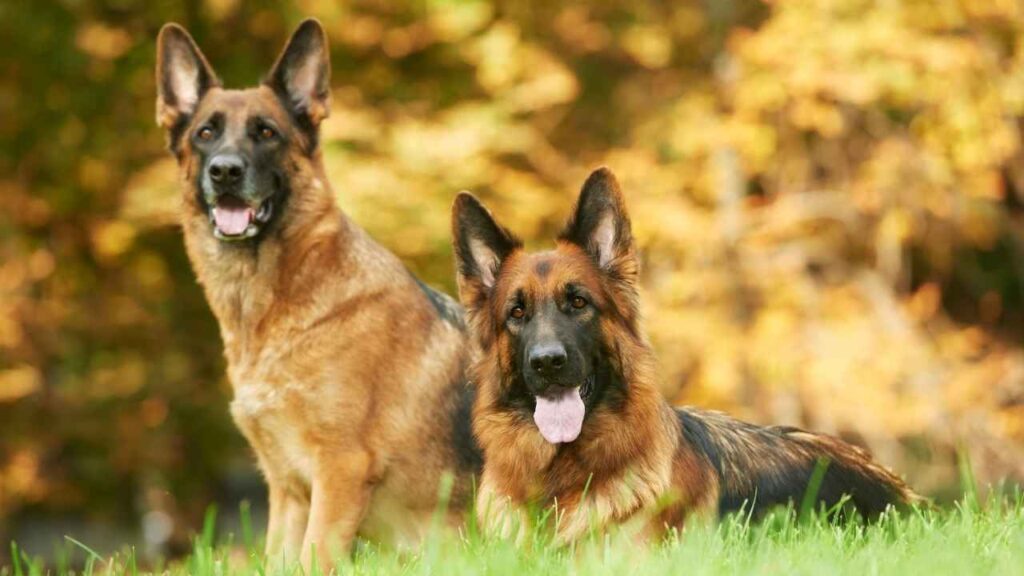
-
Ranked #3 smartest dog breed (right behind Border Collies and Poodles)
-
Eager to please – They want to learn and love having a job
-
Fast learners – Can pick up commands in fewer than 5 repetitions
-
Obedience master – Responds to first commands nearly 95% of the time
German Shepherds are basically born for boot camp. This is why they’re police dogs, military heroes, bomb detectors, and—you guessed it—very obedient roommates.
Bonus Trick: They don’t just learn commands—they can link them together and problem-solve in real time. (Yes, they can literally open doors.)
Rottweiler:
Training Style: “I get it. I’m just deciding if it’s worth my time.”
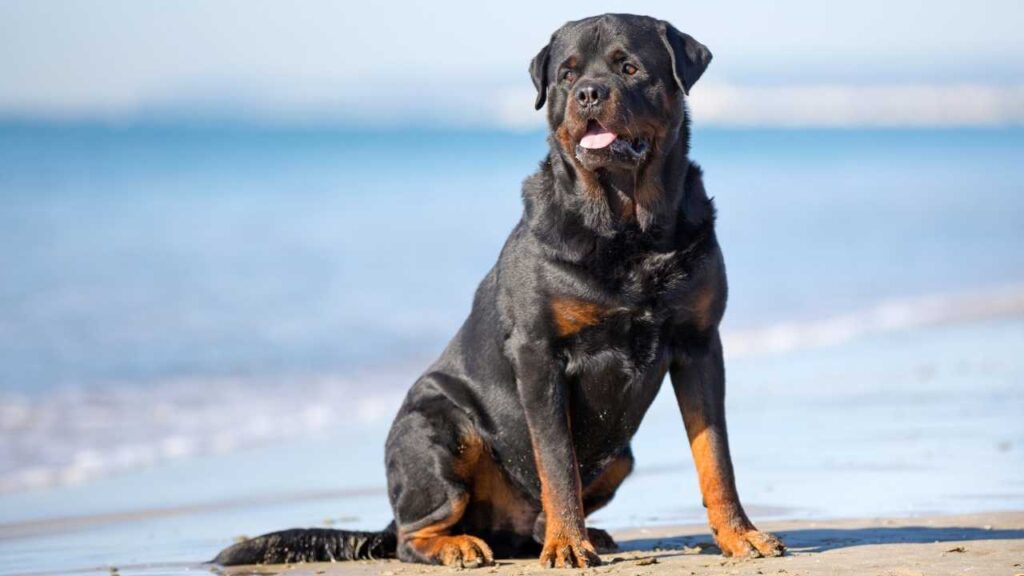
-
Ranked #9 in dog intelligence
-
Highly capable – Especially with a firm, consistent trainer
-
Independent thinker – Smarts with a side of stubborn
As per Britannica, Rottweiler shines in a wide range of organized activities—from agility and scent work to Schutzhund training (a protection dog sport focusing on obedience, tracking, and guarding skills), as well as cart pulling, weight pulling, and other exercises that challenge both their mind and body.
Bonus Trick: Rotties excel in protection sports, obedience, and tracking—when they’re properly motivated (hint: use praise and tasty treats)
Aggression and Temperament Differences
German Shepherd:
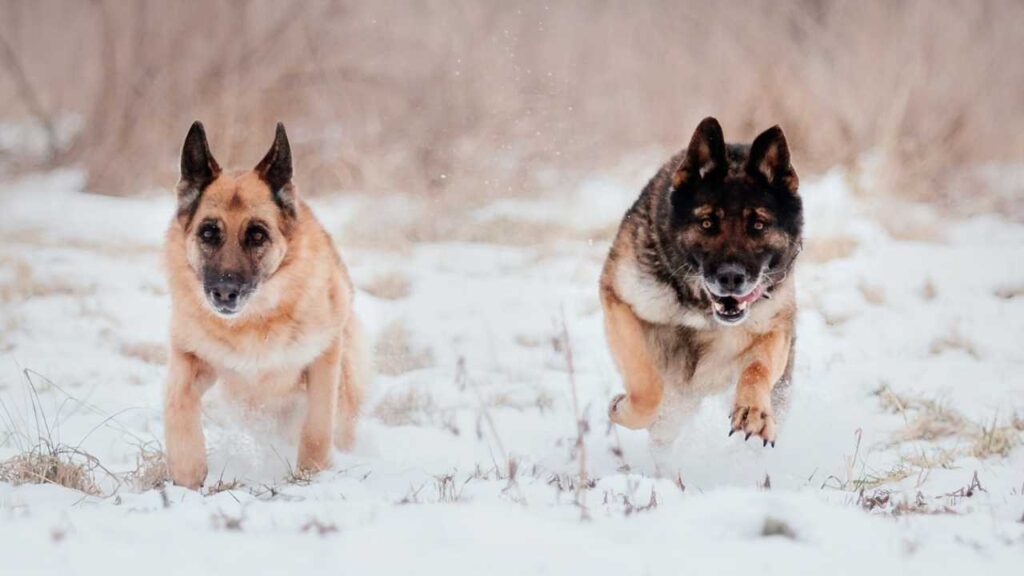
-
Aggression Level: Typically low unless properly trained or provoked
-
Temperament:
-
Alert, watchful, and confident
-
Reliable Protectors but not aggressive by nature
-
Highly trainable to distinguish real threats from everyday life
-
Socialized Shepherds are friendly with family, kids, and strangers when introduced properly
-
German Shepherds are like the calm professional on the job. They know when to be serious and when to chill. That ability to stay cool and focused — even in stressful situations — is exactly why they’re police and military favorites.
Rottweiler:
-
Aggression Level: Can be higher if untrained or unsocialized
-
Temperament:
-
Naturally, personal protection dogs and territorial
-
Can be suspicious of strangers
-
Needs firm, consistent training and early socialization
-
Very devoted and affectionate with family, but may challenge authority without leadership
-
Rottweilers wear their guard dog badge proudly—they’re not shy about protecting their turf. Without guidance, this can look like aggression, but with structure, they’re steady and loving.
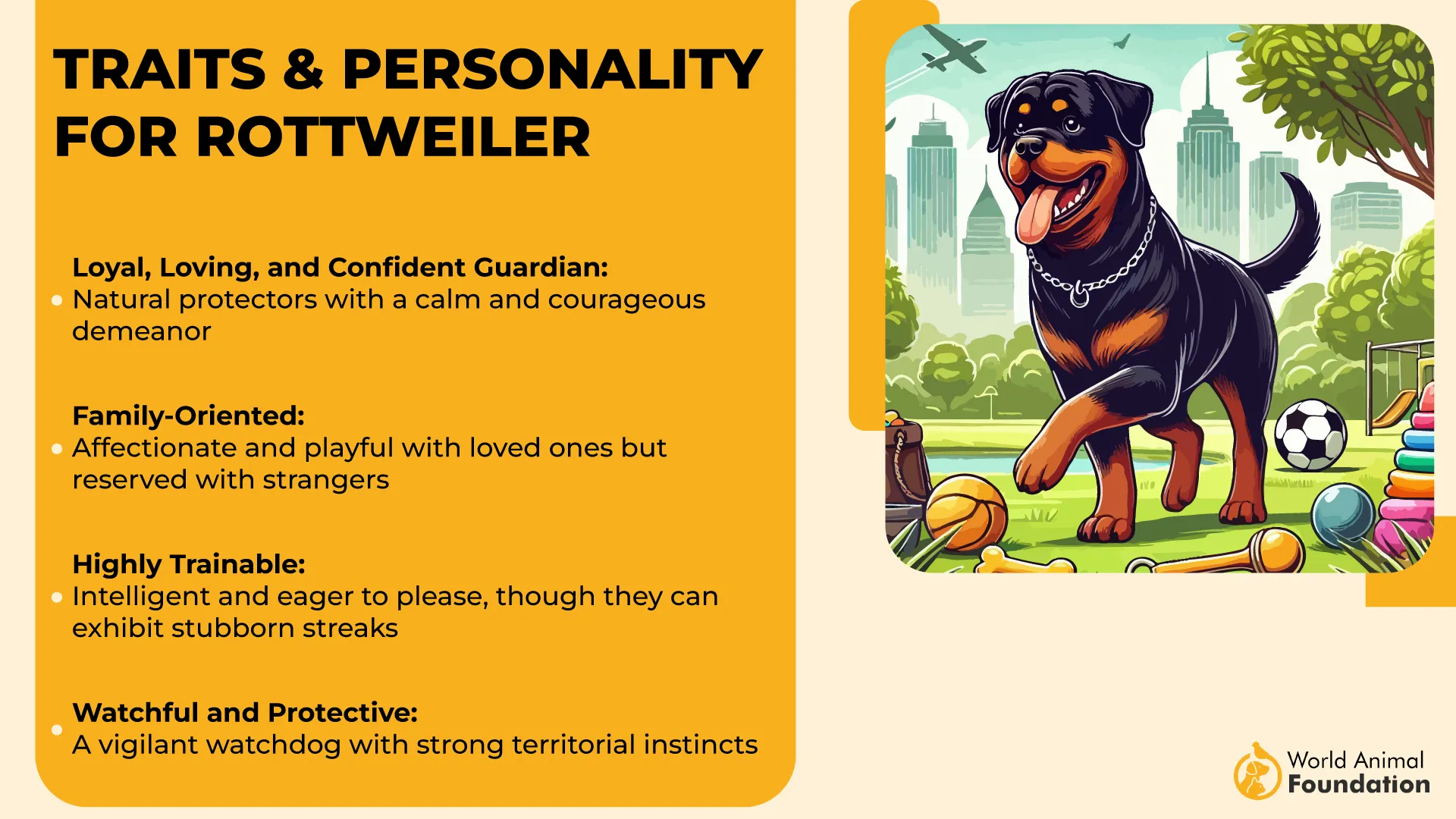
Why German Shepherds Are Used in Police Work
✅ According to the American Kennel Club (AKC), German Shepherds are highly obedient and respond instantly to commands, even in chaos. Police work demands a dog that listens better than some humans, and GSDs deliver.
✅ They combine protective instincts with a calm, stable demeanor. This means they’re less likely to become needlessly aggressive or lose control on the job.
✅ Their lean, athletic build helps them chase suspects, navigate obstacles, and endure long hours without tiring.
✅ German Shepherds can assess situations and make decisions—like when to hold back or engage—without constant human direction.
✅ They can be socialized to work in busy urban environments with lots of distractions, plus they’re good with handlers and civilians alike.
Which Breed Is Right for You?
If you want a versatile, intelligent, active companion who’s always eager to learn new tricks, join you on hikes or runs, and thrives when given a job to do, a German Shepherd is your go-to. They’re the perfect blend of brains, energy, and loyalty, making them excellent family dogs, working partners, and all-around best friends.
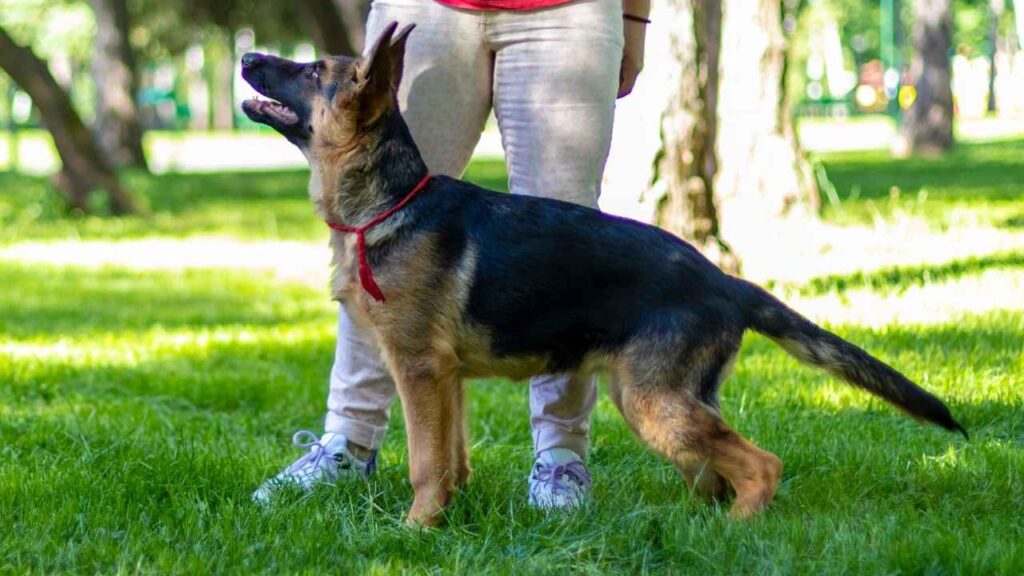
If you want a loyal, powerful protector who loves their family fiercely, stands guard with quiet confidence, and isn’t afraid to step up when needed, a Rottweiler might be the perfect match. They bring a calm strength and unwavering devotion, pairing a gentle side with serious muscle, making them both a loving cuddle buddy and a top-notch guardian.
Both breeds bring tons of love, loyalty, and unforgettable moments to any home. But remember, these dogs aren’t just pets — they’re lifelong companions who need plenty of attention, consistent training, and respect to bring out their very best. If you’re ready for that commitment, either breed will reward you with unmatched friendship and protection.
Conclusion
Choosing between a German Shepherd and a Rottweiler means picking from two loyal, family-friendly, and powerful working breeds, both with distinct traits and devoted personalities. Both German Shepherds and Rottweilers tend to be big, tough dogs with strong protectiveness, but also require proper care, consistent training, and plenty of socialization to thrive, especially around small children.
While male German Shepherds are often praised for their versatility as service dogs, Rottweiler owners appreciate their calm confidence and strength. Unlike Golden Retrievers, these large breeds may be less overtly friendly but are just as loving with the right upbringing. Watch for weight gain, understand their grooming needs, and keep in mind that both are praise-motivated, intelligent, and highly trainable, more so than many other breeds. Ultimately, whether you choose a Rottweiler or a German Shepherd, you’re welcoming a bold companion with heart and loyalty to match.


